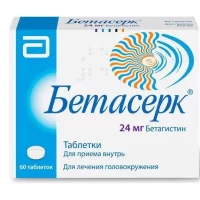Description
Betahistine Pharmacodynamics
Agonist of H1-histamine receptors of inner ear vessels and antagonist of H3-histamine receptors of vestibular nuclei of the central nervous system (CNS). By relaxing the precapillary sphincters of the vessels of the inner ear, it improves blood flow in the vascular band of the inner ear. Increases blood flow in the brain, dose-dependently reduces the generation of action potentials in the neurons of the lateral and medial vestibular nuclei. It accelerates recovery of vestibular function after unilateral vestibular neurectomy, facilitating and accelerating central vestibular compensation (due to antagonism with H3-histamine receptors). Relieves symptoms of Meniere’s syndrome and vertigo.
Indications
Treatment of Meniere’s syndrome characterized by vertigo (accompanied by nausea and vomiting), decreased hearing and tinnitus. Symptomatic treatment of vestibular vertigo (vertigo).
Contraindications
Hypersensitivity to the components of the medicinal product, pregnancy, breast-feeding, children under 18 years of age (due to lack of data), pheochromocytoma, lactose intolerance, lactase deficiency, glucose-galactose mastabsorption.
Caution
Gastric or 12 duodenal ulcer (in anamnesis), bronchial asthma. Administration during pregnancy and lactation
There are not enough data to estimate the effect of the drug during pregnancy and lactation. For this reason, the drug is contraindicated in pregnancy. Breast-feeding must be stopped during the treatment period.
Dosage and administration
- Orally, with meals, without chewing, drinking plenty of fluids, 1 tablet (24 mg), 2 times a day. Treatment is long, improvement is sometimes observed within a few weeks, the best results in some cases are achieved after several months of treatment. The course of treatment is determined individually.
- Dose adjustment in elderly patients is not required. Special studies in patients with renal/hepatic impairment have not been conducted, but post-registration experience suggests that no dose adjustment is required in this category of patients.





